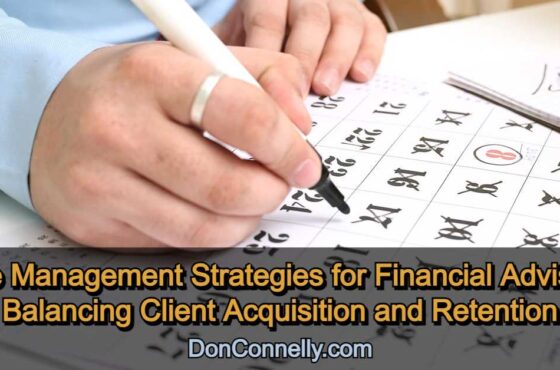Top 5 Critical Acquired Skills Financial Advisors Need for Success
 There was a time in the not-so-distant past when the only skill you needed to succeed in financial services was how to sell. The business of selling investments was almost entirely transactional, and all a financial advisor needed to do was shake the bushes for prospects and close them on a product sale. It was not easy by any means, and only the most tenacious advisors survived.
There was a time in the not-so-distant past when the only skill you needed to succeed in financial services was how to sell. The business of selling investments was almost entirely transactional, and all a financial advisor needed to do was shake the bushes for prospects and close them on a product sale. It was not easy by any means, and only the most tenacious advisors survived.
Certainly, that required some skill, but most were learned through memorizing scripts and drilling on closing techniques. The rest was all about persistence in dialing the phone.
Fast forward to today, and the game has changed drastically. With compensation coming largely from recurring revenue from assets under management or planning fees, advisors have had to develop an entirely new skill set. Tenaciousness, persistence, dogged determination, and knowing how to sell are still essential, but they take a back seat to more critical skills needed to succeed in the business today. Here are five such acquired skills you need to master.
#1. Technical competency
It’s a given that financial advisors must master a wide range of financial concepts across several disciplines, including financial planning, tax planning, investment strategies, retirement planning, and estate planning. The knowledge required is as vast as any profession outside of medicine, and the learning never stops.
The skill is in taking that knowledge and learning how to apply it in different situations so that it makes sense to clients. Translating technical knowledge into useful financial advice is a critical skill because if your clients don’t understand it, they won’t have any confidence in you or your advice.
#2. Communication and interpersonal skills
In today’s version of financial advice, the profit is not in the transactions—it’s in the relationship. The success of any financial advisor hinges upon their ability to build a solid, trusting relationship with prospects and clients. They must be relatable and build personal connections.
Some advisors are naturally blessed with people skills. Many must work at it, developing critical interpersonal or soft skills. The ability to build rapport, demonstrate empathy, and listen actively doesn’t come naturally to many people, especially those with deeply ingrained analytical talent. When building and retaining relationships with people, your technical knowledge (and accompanying jargon) must take a back seat to your soft skills, which requires practice, practice, and more practice.
#3. Selling skills
OK, maybe you don’t like the term “selling skills” because you don’t think of yourself as a salesperson. Whatever term you prefer, you are in the business of persuading or convincing people to act, whether it’s to sign on with you as their advisor or act on your financial advice. If you can’t do that, you stand little chance of success.
The key to developing effective selling skills is to incorporate them into your process or structure. You should have a structured phone approach, with a script initially. You need a repeatable multi-step process for “selling” your prospect on you and your services.
Giving structure to your approach allows you to more effectively incorporate the critical soft skills that comprise “selling,” such as knowing when and how to use active listening, demonstrate empathy, or tell a story to persuade your prospect that you can be trusted.
#4. Business development skills
If you’ve been in the business for any length of time, you know that your success is entirely dependent on talking to as many qualified people as possible. That means fleshing out leads, cultivating them, converting them into prospects, and then turning those into clients—a six-month process at best. It has to be a non-stop process because you don’t know who or when anyone might make it through your pipeline.
This requires developing successful habits as much as it does skills. Fortunately, with the advent of technologies such as websites, CRM software, email and content marketing programs, social media, and data analytics, you can set up a digital marketing apparatus that automates much of the process so you can focus on developing your soft skills to bring your leads and prospect along through the pipeline.
#5. Organizational skills
Your most valuable asset as a financial advisor is your time—the time needed to acquire the critical skills while building your business. Effective time management requires solid organizational skills to know how to structure your day, set priorities, and track your progress, all while leaving sufficient time to respond to clients and work on self-development (including ongoing education and developing and refining critical skills.
Equally important is that you manage your time well enough that you aren’t working well into the evening, so you have time to focus on yourself and create a healthy work-life balance.
Watch this 3-minute video to learn how our 24-step training program can help you develop and hone your soft skills and take your business to the next level!
See program details and enroll today!
Available as a self-paced program (always open) and as a 12-week coaching program (open only a couple of times a year), this training will change the way you view your practice and will give you an enormous advantage over your competition. Select your format and enroll now!



